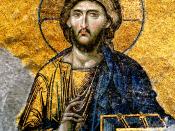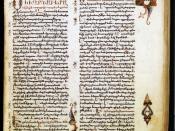Arianism
A heresy which arose in the fourth century, and denied the Divinity of Jesus Christ.
DOCTRINE
First among the doctrinal disputes which troubled Christians after Constantine had
recognized the Church in A.D. 313, and the parent of many more during some
three centuries, Arianism occupies a large place in ecclesiastical history. It is not a
modern form of unbelief, and therefore will appear strange in modern eyes. But we
shall better grasp its meaning if we term it an Eastern attempt to rationalize the
creed by stripping it of mystery so far as the relation of Christ to God was
concerned. In the New Testament and in Church teaching Jesus of Nazareth
appears as the Son of God. This name He took to Himself (Matt., xi, 27; John, x,
36), while the Fourth Gospel declares Him to be the Word (Logos), Who in the
beginning was with God and was God, by Whom all things were made.
A similar
doctrine is laid down by St. Paul, in his undoubtedly genuine Epistles to the
Ephesians, Colossians, and Philippians. It is reiterated in the Letters of Ignatius, and
accounts for Pliny's observation that Christians in their assemblies chanted a hymn
to Christ as God. But the question how the Son was related to the Father (Himself
acknowledged on all hands to be the one Supreme Deity), gave rise, between the
years A. D. 60 and 200, to number of Theosophic systems, called generally
Gnosticism, and having for their authors Basilides, Valentinus, Tatian, and other
Greek speculators. Though all of these visited Rome, they had no following in the
West, which remained free from controversies of an abstract nature, and was
faithful to the creed of its baptism. Intellectual centers were chiefly Alexandria and
Antioch, Egyptian or Syrian, and speculation was...


